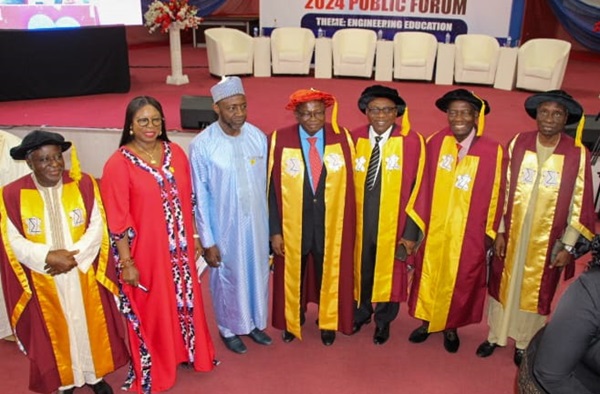
Vice President of Nigeria, Kashim Shettima has announced that Nigeria is well positioned to tap into the global outsourcing market worth around $360 billion.
Speaking at the public forum of the Nigerian Academy of Engineering in Abuja, he explained that the Outsource to Nigeria Initiative, launched earlier this year, aims to leverage the nation’s youthful population to position it as a global outsourcing hub.
Nigeria’s young population is growing at over 3 per cent per annum, at a time when many developed nations are seeing ageing populations and workforces. According to Shettima, the country can train its young citizens to take up not just jobs in Nigeria but globally.
The vice president highlighted the role of engineers in writing the rebirth story of the country, adding that the government needed to continue collaborating with professional bodies like the Nigerian Academy of Engineering to ensure that the quantity and quality of engineers meet the moment and match the needs of national aspirations.
Shettima also stressed the need for improved gender balance in the field of engineering through greater female inclusion in the profession. He cited a study commissioned by the Royal Academy of Engineers that looked at 99 different countries across the world, which showed that the most advanced countries were also those with the highest number of engineering jobs, highest wages for engineers and the highest gender balance in engineering.
He urged the government to work to make workplaces conducive and inclusive, as the world would be a worse place without the incredible work of female engineers.
The Speaker of the House of Representatives, Hon. Tajudeen Abbas assured participants at the forum of the lower chamber’s commitment to supporting initiatives that promote the advancement of engineering and technological innovation in the nation. He highlighted its benefits to citizens, including empowerment through skill acquisition, capacity building through continuous learning and knowledge sharing and community engagement that encourages collaboration to address issues of concern.
The president of the Nigerian Academy of Engineering, Prof. Peter Onwualu noted that the forum was convened to provide a sector-based roadmap to revitalise engineering education in Nigeria. He stated that if Nigeria prioritises and uses engineering and technology to drive development in all sectors, the country will soon join the league of developed nations.
With engineering, Nigeria “would have been able to solve our problems in food and agriculture, healthcare, communications, transportation, energy and power, commerce and industry and indeed all other sectors,” he added. He concluded that the academy was willing to advise the government on how to achieve this successfully.
Nigeria is well positioned to tap into the global outsourcing market worth around $360 billion and the Outsource to Nigeria Initiative launched earlier this year seeks to leverage the nation’s youthful population to position it as a global outsourcing hub. The country can train its young citizens to take up not just jobs in Nigeria but globally. The government needs to continue collaborating with professional bodies like the Nigerian Academy of Engineering to ensure that the quantity and quality of engineers meet the moment and match the needs of national aspirations. Also, there is the need for improved gender balance in the field of engineering through greater female inclusion in the profession.

